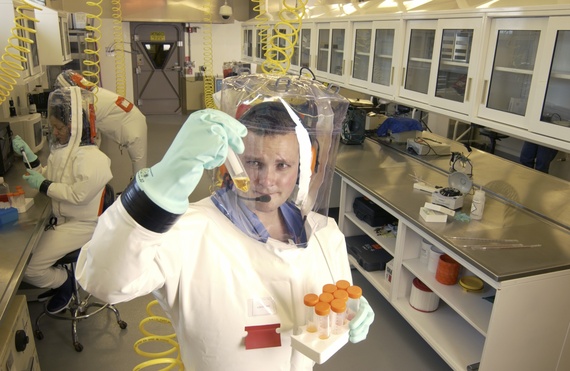Photo courtesy of Texas Biomedical Research Institute
I recently had the chance to speak with Jean L. Patterson, Chair of Virology and Immunology at the Biomedical Research Institute in San Antonio, Texas. Dr. Patterson holds a Ph.D. from the University of Notre Dame. She has taught at many institutions, including the University of Texas Health Science Center and Harvard University. She has also conducted extensive research on hemorrhagic fevers (Marburg, Lassa, and Ebola viruses). Dr. Patterson tells us what role she thinks science plays in combating Ebola.
Donna A. Patterson: Your background in virology and microbiology is extensive. Presently, you are working on a number of projects related to hemorrhagic fevers, such as Ebola, as well as work on vaccines. How does the current situation in West Africa impact research and development? Do you think that vaccines or serums can play an important role in this current crisis?
Jean L. Patterson: We have been working on countermeasures to filoviruses and other hemorrhagic fevers for over a decade. Our work has not changed, though the epidemic has made us all more mindful that we need to get it right with every experiment. I am sure that vaccines and treatments such as monoclonal antibodies will also be utilized to help stop this and future outbreaks.
D.P.: What can we expect in five years? Will Ebola vaccines be widely available, and will the world be able to handle future outbreaks in unexpected places?
J.P.: I believe an Ebola vaccine will be available as long as investigators recognize that only vaccines that qualify under the animal rule will be utilized. Again, our experiments must be done with special care so that the animal rule can work.
D.P.: In a recent conversation, we discussed how no one could have predicted the current Ebola crisis in West Africa. A recent report from Oxford University argues that 15 African countries are at risk for animal-human transmission of Ebola. Should we be concerned about unexpected eruptions in other previously unaffected countries?
J.P.: If there is one thing this outbreak has taught us, it's that we really don't know enough about how this virus spreads and how to treat patients. Given that we don't know for sure what the animal reservoir truly is or how many reservoirs there are, outbreaks will no doubt continue to surprise us.
D.P.: A recent CDC report, using data through August 2014, projected that as many as 1.4 million people could be infected with Ebola by January 2015. Do you think that the insertion of the U.S. military and increased funding from aid agencies, the African Union, and Western countries will help to stem the tide of transmission?
J.P.: I am convinced that adding U.S. troops and well-trained physicians and epidemiologists will help bring the numbers down from the projected 1.4 million number.
D.P.: What do healthcare workers and logistical support staff need most to protect themselves and begin to contain this outbreak?
J.P.: Healthcare workers absolutely need the best personal protection equipment (PPE) and enough staff to alleviate fatigue by rotating shifts. The resources have clearly not yet been sufficient to thwart the threat.
D.P.: At this juncture, what do you think are the three most critical actions to contain this epidemic?
J.P.: [We need] more well-trained staff, better PPE, and possible medical countermeasures. However, at this time, new medical countermeasures will not help as much as supportive care. Most of the countermeasures will need to be given prior to or immediately after infection. Finding folks potentially exposed is critical.
D.P.: Do you think that all of the current attention that the Ebola virus is receiving will also benefit countries with a history of Ebola outbreaks? Will the Democratic Republic of the Congo also be the site of experimental pharmaceutical support in the near future?
J.P.: I certainly hope so; this outbreak is a true wake-up call. We say that all of the time, but given that this type of epidemic was never on anyone's radar screen, it is obvious that we are behind the curve on understanding how an outbreak can start and how important it is to move quickly with an all-hands-on-deck approach to curb what looks like even a small outbreak.
